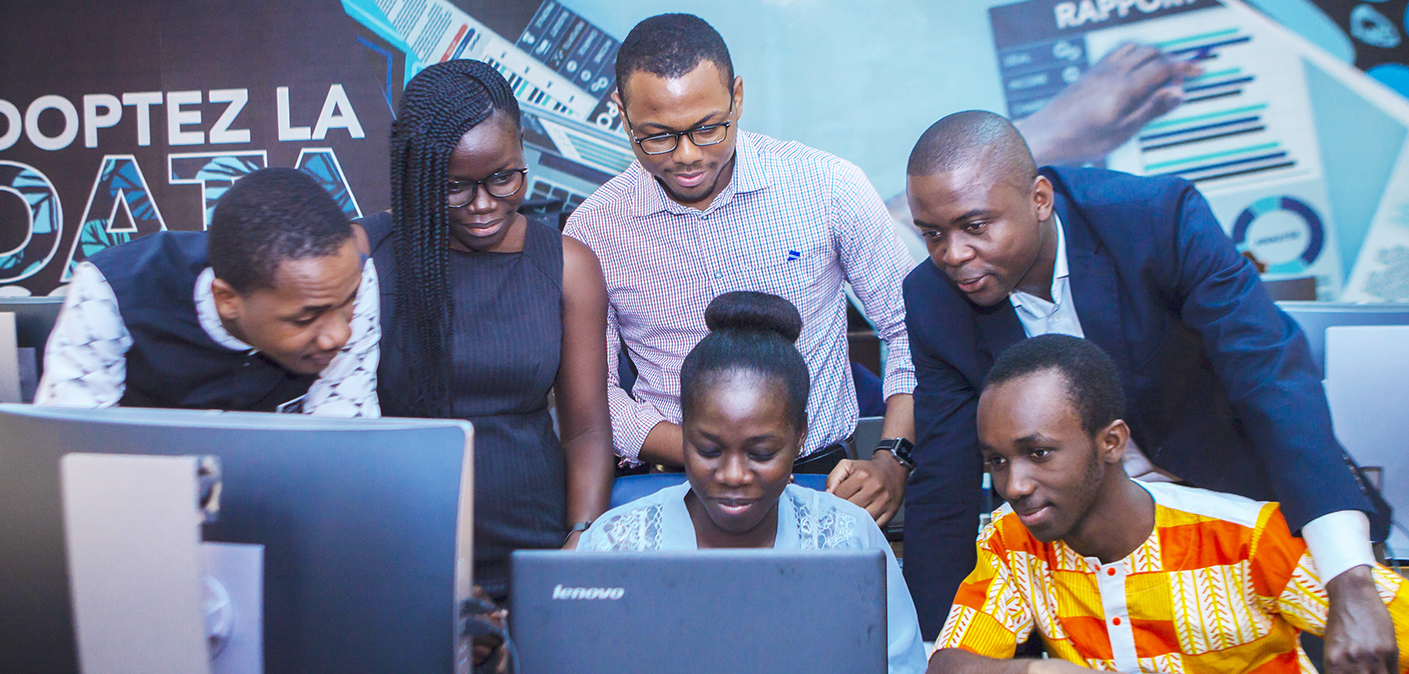DCDJ SuperFellows: Reinforcing Improvements & Sustainability in the Data Ecosystem

Since 2018, Development Gateway has led the Des Chiffres et Des Jeunes (DCDJ) project, with support from MCC-PEPFAR Data Collaboratives for Local Impact (DCLI) Program. A mainstay of DCDJ is the Data Fellowship program, which is implemented in partnership with SEJEN. The Fellowship provides intensive data science training to young professionals in Cote d’Ivoire. After the training, DCDJ Data Fellows are placed in internships with government ministries, agencies, or NGOs that contribute to PEPFAR objectives. The SuperFellows are an outgrowth of the Fellowship program, and reinforce capacity building and improvements to the data ecosystem.
 |
||
“Working to improve the data ecosystem every day is really exhilarating and it’s a great opportunity to help my younger brothers & sisters. Being able to guide and support them is really heartwarming. Through the SuperFellows we have a bigger & stronger impact – adding to the work the Fellows are already doing.”
|
Maintaining Momentum
During the program, Data Fellows work with the placement organizations to implement new tools, dashboards, and processes to support improved data quality, timeliness, and use. For example, one Data Fellow created a data compilation tool to speed data processing time, others improved data visualizations, and others identified the need for a new indicator at the national level. While the Data Fellows are at their sites, these innovations are used. However, we saw an indication that new tools and processes were often abandoned after Fellows complete their internships due to organizational and resource limitations.
We identified a need to measure the first cohort’s impact on their placement sites. To learn more about which tools were still in use, we asked five alumni from the first Fellowship cohort for help to conduct a survey. They found that 50% of improvements had fallen out of use. In addition to findings at the organizational level, we also discovered that communities’ understanding of the value and use of data for decision-making was low, and data use culture was weak. We began to work through solutions.
SuperFellows as the Solution
After their survey evaluation, it became clear that the same alumni who helped with the survey could continue to support the project and reinforce improvements to the data ecosystem and create more sustainable results. The five “SuperFellows,” as they became known, were hired onto DCDJ on a more permanent basis.
After going through their own community engagement training, SuperFellows were assigned to support specific placement sites. Additionally, the SuperFellows provided “re-training” for former placement sites after it was discovered that some tools had fallen out of use. The retraining ensured that innovations would be retained and sustainably incorporated back into the organizations.
SuperFellows Impacts
 |
The SuperFellows have been an important part of reinforcing DCDJ impacts, making information available for responsive HIV programs, and improving Cote d’Ivoire’s data ecosystem. In addition to bringing innovations back into use, we’ve also been able to glean insight into why some innovations fall out of use – and how to ensure sustainability in future Fellowship programs. The SuperFellows have been able to increase data tool usage sustainability from 50% to 80%.
They have also been involved in community promotion and raising data use awareness, leveraging their own personal and professional networks to spread knowledge of the program. As a result, the number of applicants for the Fellowship program increased by 38% from the first to the second cohort, and by an additional 12% in the third cohort.
Finally, SuperFellows act as mentors to the current cohort. They provide placement site check-ins and tool-building guidance, which equates to faster and more effective tool and process development. Through regular follow-up and additional, continued support from SuperFellows, significant value is added to the DCDJ Data Fellowship and the PEPFAR objectives it supports.
Share This Post
Related from our library

From Standardization to Specificity: Localizing Multi-Country Research
Multi-country research must balance consistency with local realities. While standardization allows reliable comparisons and generalizable insights, local context shapes outcomes. This blog explores how programs can strike that balance effectively.

Economic Toll of Tobacco-Related Diseases in Kenya: New Research Findings
Development Gateway: An IREX Venture (DG) is pleased to announce the publication of a research manuscript on the Economic Costs of Tobacco-Related Illnesses in Kenya. This research was carried out as part of the Tobacco Control Data Initiative (TCDI) activities in Kenya and is part of a broader report on Morbidity and Mortality from Tobacco Use in Kenya.

Unlocking Africa’s Agricultural Potential: Introducing the Soil Nutrient Roadmap
For over a decade, Development Gateway: An IREX Venture (DG) has been at the forefront of digital agriculture, leveraging agricultural data to support input monitoring, value chain analysis, and farmer-centric governance models. With funding from the Gates Foundation, DG is launching the Soil Nutrient Roadmap (SNR), a cutting-edge initiative using geospatial data to estimate current and future soil and crop nutrient requirements.